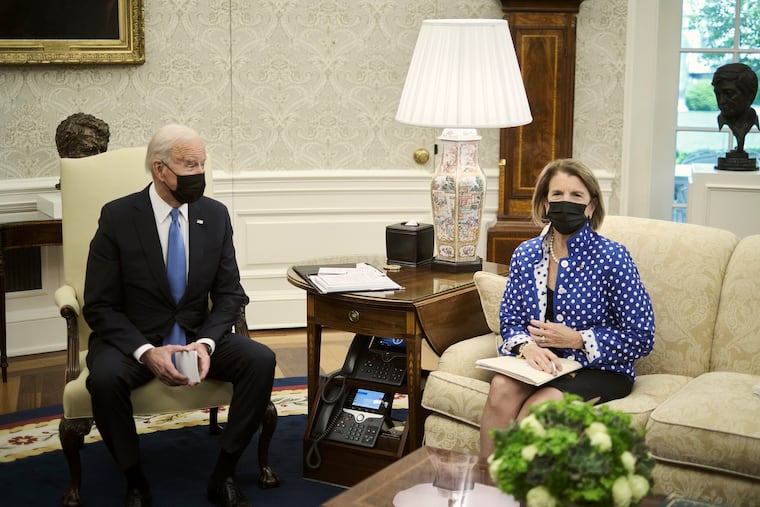White House infrastructure talks with Sen. Capito collapse, leading to fingerpointing as Biden shifts strategy
The administration will now focus its efforts on conversations with a bipartisan group of senators, as it continues to search for support for the president's wide-ranging infrastructure package.

WASHINGTON — President Joe Biden and Sen. Shelley Moore Capito, R-W.Va., ended negotiations over the president’s infrastructure package on Tuesday as the two sides failed to strike a deal after weeks of talks.
The administration will now focus its efforts on conversations with a bipartisan group of senators, as it continues to search for support for the president’s wide-ranging infrastructure package, an administration official said Tuesday.
And Senate Democrats are looking at the possibility of breaking the infrastructure package in two. They could try to assemble one bill with Republicans and then try to pass a separate measure with only Democratic support in an effort to meet all of their objectives, but both strategies could prove difficult execute.
Biden spoke Tuesday afternoon with Sen. Bill Cassidy, R-La., who has been part of the bipartisan effort, which will meet Tuesday evening, as well as Sens. Joe Manchin, D-W.Va., and Kyrsten Sinema, D-Ariz.
An administration official said the talks with Capito, the GOP’s top negotiator, fell apart after the president could not get her group to increase their overall spending on the plan, and they continued to disagree on how to pay for it.
“He informed Senator Capito today that the latest offer from her group did not, in his view, meet the essential needs of our country to restore our roads and bridges, prepare us for our clean energy future, and create jobs,” White House press secretary Jen Psaki said in a statement. “He offered his gratitude to her for her efforts and good faith conversations, but expressed his disappointment that, while he was willing to reduce his plan by more than $1 trillion, the Republican group had increased their proposed new investments by only $150 billion.”
But Capito pinned the blame on the president, saying she was “disappointed by his decision” to end the talks after refusing her latest offer on a revised package.
“Despite the progress we made in our negotiations, the president continued to respond with offers that included tax increases as his pay for, instead of several practical options that would have not been harmful to individuals, families, and small businesses,” she said in a statement. “While I appreciate President Biden’s willingness to devote so much time and effort to these negotiations, he ultimately chose not to accept the very robust and targeted infrastructure package, and instead, end our discussions.”
There were numerous areas of disagreement. Biden had originally proposed raising the corporate tax rate from 21 percent to 28 percent as part of the plan, but many Republicans remained adamant that the corporate tax rate wouldn’t change. Biden later showed an openness to only raising the rate to 25 percent, and last week began pushing Republicans to see if they would accept any tax changes whatsoever.
Many Republicans had agreed that there needed to be large investments in U.S. infrastructure, but they had alleged that Biden’s original definition of “infrastructure” was too broad. For example, many Republicans objected to Biden’s proposal that would include spending on eldercare and other services as part of the package
Biden had proposed a massive infrastructure package as a key part of his 2020 campaign, saying he wanted to rebuild roads, bridges, highways and ports, expand access to housing and broadband, and effectively modernize the United States for the 21st century.
Senate Majority Leader Charles Schumer, D-N.Y., now faces a crucial decision over how to proceed. He could try to advance a measure with only Democratic votes through a process called “reconciliation,” but there would be little room for error because the Senate is split 50-50. Biden’s outreach to Republicans on Tuesday suggests he still wants to find a way to assemble a bipartisan coalition, only now it appears possible that Capito might not be part of it.
Speaking to reporters Tuesday before talks collapsed, Schumer said Democrats are proceeding on two paths.
On one track are newly emerging conversations between Biden and a bipartisan group of lawmakers, including Sinema and Portman, who are “trying to put something together that might be close to what the president needs.” At the same time, however, Schumer said Democrats are getting to work on reconciliation, acknowledging that Democrats are unlikely to accomplish everything they hope in a bill crafted alongside the GOP.
“It may well be part of the bill that’ll pass will be bipartisan, and part of it will be through reconciliation,” Schumer said. “But we’re not going to sacrifice the bigness and boldness in this bill.”
The president’s efforts at negotiations, however, could be slowed as he leaves Wednesday for his first international trip. Psaki said Biden has designated members of his cabinet and senior White House staff to continue conversations as he heads overseas.
The White House has also not ruled out pushing the legislation through budget reconciliation if they cannot strike a deal with Republicans.
“The President is committed to moving his economic legislation through Congress this summer, and is pursuing multiple paths to get this done,” Psaki said in her statement.
The Washington Post’s Tony Romm contributed to this report.